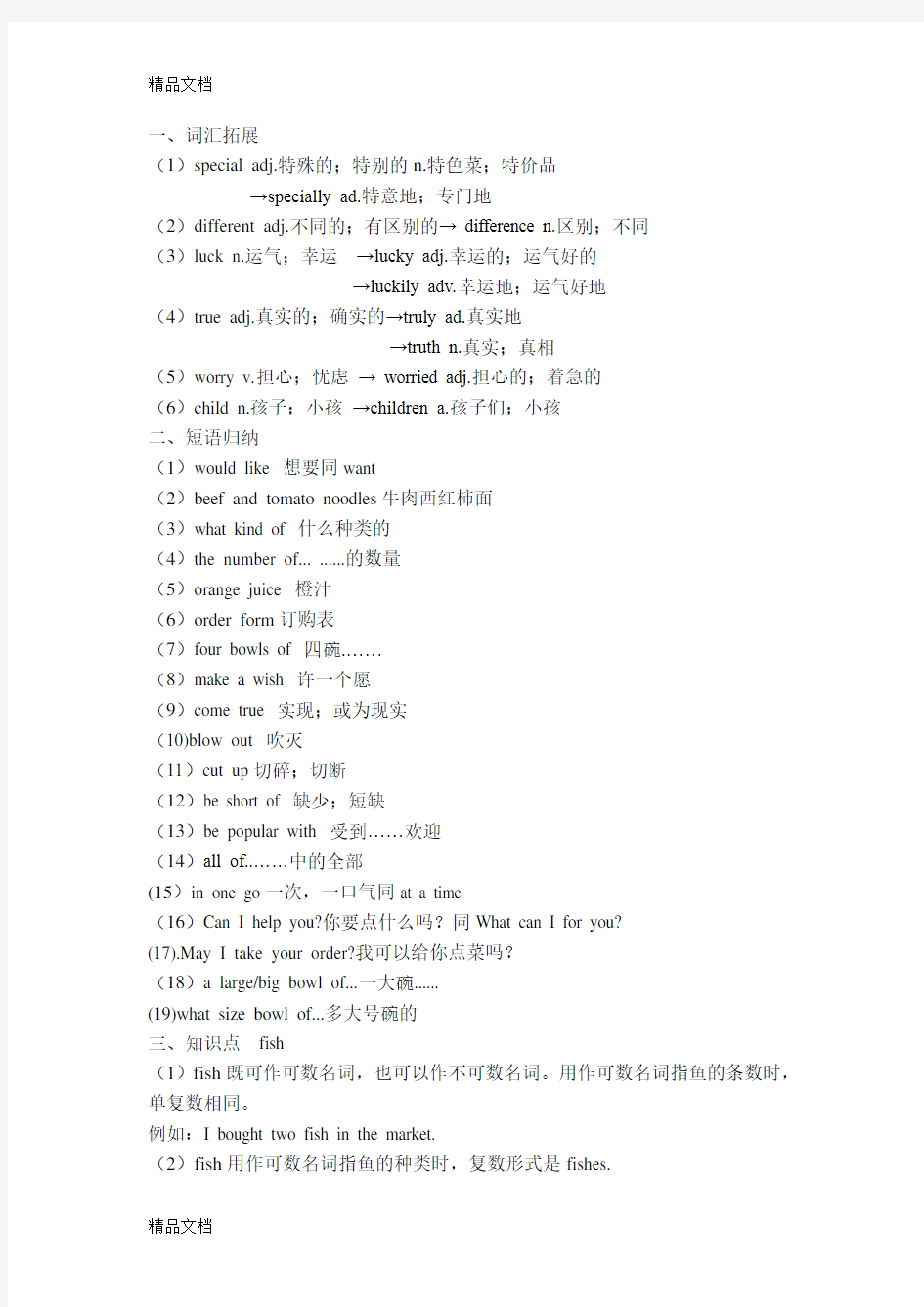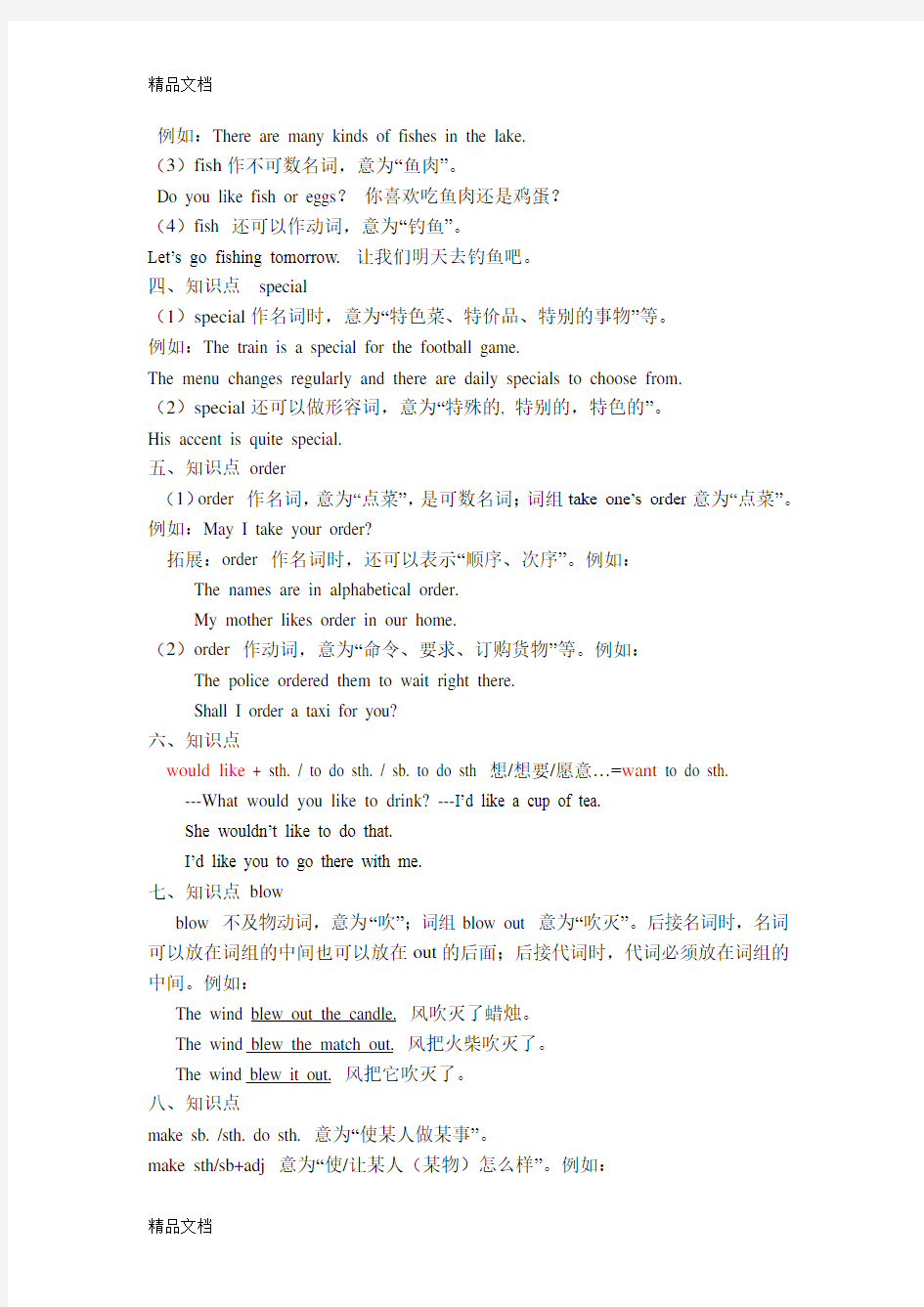

一、词汇拓展
(1)special adj.特殊的;特别的n.特色菜;特价品
→specially ad.特意地;专门地
(2)different adj.不同的;有区别的→ difference n.区别;不同
(3)luck n.运气;幸运→lucky adj.幸运的;运气好的
→luckily adv.幸运地;运气好地
(4)true adj.真实的;确实的→truly ad.真实地
→truth n.真实;真相
(5)worry v.担心;忧虑→ worried adj.担心的;着急的
(6)child n.孩子;小孩→children a.孩子们;小孩
二、短语归纳
(1)would like 想要同want
(2)beef and tomato noodles牛肉西红柿面
(3)what kind of 什么种类的
(4)the number of... ......的数量
(5)orange juice 橙汁
(6)order form订购表
(7)four bowls of 四碗.……
(8)make a wish 许一个愿
(9)come true 实现;或为现实
(10)blow out 吹灭
(11)cut up切碎;切断
(12)be short of 缺少;短缺
(13)be popular with 受到……欢迎
(14)all of..……中的全部
(15)in one go一次,一口气同at a time
(16)Can I help you?你要点什么吗?同What can I for you?
(17).May I take your order?我可以给你点菜吗?
(18)a large/big bowl of...一大碗......
(19)what size bowl of...多大号碗的
三、知识点fish
(1)fish既可作可数名词,也可以作不可数名词。用作可数名词指鱼的条数时,单复数相同。
例如:I bought two fish in the market.
(2)fish用作可数名词指鱼的种类时,复数形式是fishes.
例如:There are many kinds of fishes in the lake.
(3)fish作不可数名词,意为“鱼肉”。
Do you like fish or eggs?你喜欢吃鱼肉还是鸡蛋?
(4)fish 还可以作动词,意为“钓鱼”。
Let’s go fishing tomorrow. 让我们明天去钓鱼吧。
四、知识点special
(1)special作名词时,意为“特色菜、特价品、特别的事物”等。
例如:The train is a special for the football game.
The menu changes regularly and there are daily specials to choose from.
(2)special还可以做形容词,意为“特殊的, 特别的,特色的”。
His accent is quite special.
五、知识点order
(1)order 作名词,意为“点菜”,是可数名词;词组take one’s order意为“点菜”。例如:May I take your order?
拓展:order 作名词时,还可以表示“顺序、次序”。例如:
The names are in alphabetical order.
My mother likes order in our home.
(2)order 作动词,意为“命令、要求、订购货物”等。例如:
The police ordered them to wait right there.
Shall I order a taxi for you?
六、知识点
would like + sth. / to do sth. / sb. to do sth 想/想要/愿意…=want to do sth.
---What would you like to drink? ---I’d like a cup of tea.
She wouldn’t like to do that.
I’d like you to go there with me.
七、知识点blow
blow 不及物动词,意为“吹”;词组blow out 意为“吹灭”。后接名词时,名词可以放在词组的中间也可以放在out的后面;后接代词时,代词必须放在词组的中间。例如:
The wind blew out the candle. 风吹灭了蜡烛。
The wind blew the match out. 风把火柴吹灭了。
The wind blew it out. 风把它吹灭了。
八、知识点
make sb. /sth. do sth. 意为“使某人做某事”。
make sth/sb+adj 意为“使/让某人(某物)怎么样”。例如:
The boss makes us work eleven hours a day.
She often makes him happy.
九、知识点
a number of表示“许多……”+名词复数+谓语动词复数
A number of students of our school have read that magazine.
A number of wild animals have been found in the forest.
the number of表示“……的数量”+名词复数+谓语动词单数。
The number of students in our school is 1,500.
十、知识点
what size 询问尺寸、大小,“多大尺寸,什么号码的”。size 是名词,可以表示物品的大小、尺寸、号码。
1)---你要多大号码的鞋?---我要38码的。
---What size shoes would you like?
---I’d like Size 38.
2)这件T恤有点小,你能给我一件大号的吗?
This T-shirt is a little small for me. Would you like to show me a larger size?
十一、知识点语法:
名词复数的变化规律
一、名词复数的构成方法及读音规则
1.一般情况加–s:例如:map—maps; drink—drinks; roof—roofs; park—parks; 例如:boy—boys; show—shows; zoo—zoos;
panda — pandas; car —cars; singer—singers;
例如:girl—girls; pen—pens; friend—friends; bag—bags; lab — labs; room —rooms;
2.以s, sh, ch, x等结尾加–es, 如:
bus—buses watch—watches box—boxes brush—brushes
match—matches fish—fishes
3.以辅音字母+y结尾,变y 为i,再加es。例如:
baby—babies; strawberry—strawberries country—countries; story—stories family—families; city—cities
但以y结尾的专有名词,或元音字母+y结尾的名词变复数时,直接加s变复数。
two Marys the Henrys
boy—boys; monkey— monkeys;
play—plays; holiday—holidays
4.以o结尾的名词,变复数时:
1)无生命的加s, 如:
photo---photos, zoo---zoos piano---pianos, radio---radios ;
2)有生命的加es, 如:
potato---potatoes, tomato---tomatoes, hero---heroes(英雄),
5.以f或fe 结尾的名词变复数时:
1)加s,如:belief---beliefs(信仰,信任)roof---roofs (房顶)scarf---scarfs / scarves (围巾)
2)去f, fe 加ves,如:
half---halves (半)knife---knives leaf---leaves wolf---wolves
wife---wives life---lives(生命)thief---thieves shelf---shelves (架子)self---selves(自己)
二、名词复数的不规则变化
1.child---children,foot---feet,tooth---teeth, goose---geese(鹅),
mouse---mice(小老鼠),man---men,woman---women,
注意:由一个词加man 或woman构成的合成词,其复数形式也是-men 和-women。
an Englishman--two Englishmen。
但German不是合成词,所以复数形式为Germans.
2.单复同形。如:
deer鹿,sheep 绵羊Chinese---Chinese; Japanese---Japanese
3.集体名词,以单数形式出现,但实为复数。
people police cattle 等本身就是复数,不能说 a people(一个人),a police,a cattle;(但是可以有:a people : 一个民族)
但在表达“一个…”时,可以说a person,a policeman,a head of cattle .
4.以s结尾,仍为单数的名词,如:
1)maths(英:数学),politics(政治),physics(物理)等学科名词,虽然后有-s,但是为单数形式。
2)news 为不可数名词。
3)the United States,the United Nations 视为单数。
4)以复数形式出现的书名,剧名,报纸,杂志名,也可视为单数。例
5.表示由两部分构成的东西,只有复数形式。
glasses; trousers; pants; shorts; shoes;compasses(圆规)scissors(剪刀)等,若表达具体数目,要借助数量词pair(对,双); suit(套)。
a pair of glasses “一副眼镜”;
two pairs of trousers “两条裤子” 等。
6.另外还有一些名词,其复数形式有时可表示特别意思。如:goods货物,waters水域,fishes(各种)鱼。
三、表示“某国人”的单复数变化:
1.加-s的词:
German---Germans (德国人)
Russian---Russians(俄罗斯人)
Roman---Romans (罗马人)
American---Americans
Arab---Arabs (阿拉伯人)
2.有变化的词有:
Frenchman---Frenchmen; Englishman-Englishmen
四、合成名词变为复数时:
1.第一个或最后一个词变成复数。
girl friend---girl friends (女朋友)
boy student---boy students (男学生)
grown-up---grown-ups (成年人)
passer-by---passers-by (过路人)
son-in-law ---sons-in-law(女婿)
2.构成合成名词的两个词都要变为复数。
man servant---men servants (男仆人)woman teacher---women teachers man doctor --- men doctors
可数名词和不可数名词
①本单元的可数名词:eggs, apples, strawberries, oranges, onions, dumplings, drinks, carrots,
②本单元的不可数名词:rice, porridge, beef, mutton, broccoli, juice
③本单元的既是可数又是不可数的名词;chicken, salad, ice cream, cabbage, soup, dessert, fish
一、用所给词的适当形式填空
1.Many children like to eat __candies______(candy).
2.He is so __lucky______(luck) this time.He gets the ticket.
3.The wind is __blowing______(blow) heavily.It's going to rain.
4.I'd like two __cups______(cup) of green tea.
5.There __is______(be) some beef and tomatoes in the noodles,do you like the noodles with beef and __tomatoes______(tomato)?